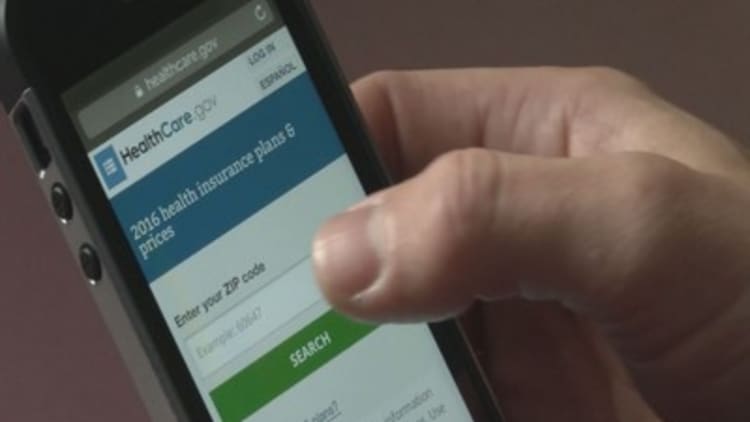They're perhaps the most important tax forms the U.S. government has introduced since the W-2 came out seven decades ago. But a lot of larger employers apparently are clueless about what they mean.
A new survey from payroll services giant ADP reveals that about 40 percent of mid-sized and large companies that are offering health coverage to workers aren't familiar with two new Obamacare-related forms that must be filed with the Internal Revenue Service starting this tax season.
"That's a bit concerning," said Vic Saliterman, ADP senior vice president and general manager for health-care reform.
The forms — the 1094-C and the 1095-C — are designed to track compliance with the Obamacare rule that mid- to large-sized employers offer affordable health insurance to workers or face a fine.
The 1094-C forms will be used by companies to indicate to the IRS where they've complied with that rule, and 1095-C forms will indicate whether a worker and his dependents have received job-based health coverage.
ADP, which provides outsourced payroll and human resources management services, found that even when companies knew about the forms, not all of them have been compiling the often-complicated data to complete them.

Twenty-one percent of firms with between 50 and 999 employees told ADP that they either haven't assembled the data yet, or weren't sure if they had. And 13 percent of firms with 1,000 or more workers said they had not started to put together that data, or weren't sure if it was being done.
"We have definitely seen challenges of pulling information," said Saliterman, noting that companies have to assemble data spread across payroll systems, benefits systems and other human resource systems to complete the forms correctly.
If companies fail to file the forms, they can be fined $260 per worker whose data was supposed to be transmitted, with a maximum penalty of $6 million if a company is found to have blatantly disregarded rules requiring the new forms, Saliterman said.
Among firms that are aware of the forms, ADP's survey more than 40 percent of mid-sized companies and more than 35 percent of the larger firms said they were just slightly prepared, or not at all prepared, to issue the 1095-C forms to their workers.
The "potential fallout" from such unpreparedness, Saliterman said, is that some employees — who must be issued 1095-C forms by their employers — "are either going to receive 1095-Cs late, or they potentially won't receive them," despite a recent deadline extension.
Employers in late December got a two-month extension of their deadlines related to the forms. They now have until March 31 to distribute the 1095-C forms to workers, and until May 31 to mail in their 1094-C forms to the IRS, or until June 30 if they file them electronically.
Saliterman said confusion among some about the new Obamacare forms isn't surprising.
He said the rules related to the forms are complicated, and "there really isn't a recent precedent" for such a big change in tax forms since 1947, when the W-2 form that lays out a worker's income and tax withholding was introduced.
The forms are tied to two key pillars of the Affordable Care Act. One requires employers with 50 or more employees who work 30 or more hours per week — considered "full-time equivalents" — to offer those workers affordable health insurance. The other key ACA mandate requires nearly all Americans to have some form of health coverage, or pay a fine.
For 2015, only employers with 100 or more full-time equivalents were required to offer health coverage or face a fine. In 2016, the mandate applies to all firm with 50 or more full-time workers.
But all firms with 50 or more full-time workers must file the 1094-C forms with the IRS this tax season, even if they weren't legally responsible for offering health coverage to their workers in 2015.
Saliterman said, "I think it's possible" that employers with between 50 and 99 workers aren't aware of the 1094-C form because they weren't subject to the Obamacare mandate in 2015.

When employers file the 1094-Cs with the IRS, they also will have to file the 1095-Cs related to individual workers, indicating whether they received job-based coverage, Saliterman said.
The workers, however, aren't required to file their own copy of the 1095-Cs with the IRS when they file their tax returns. The form is meant for the employee's own tax records.
The IRS requires individual filers only to check a single box on the 1040 or 1040EZ forms to indicate whether they had health coverage as required by Obamacare over the course of the year. If a person fails to have coverage for the year, they then have to file another form to calculate their penalty, which for 2015 was the higher of $325 per person, or 2 percent of taxable household income.
ADP's survey found that 83 percent of mid-sized employers and 57 percent of large firms didn't believe their workers clearly understand the form.
"It's important for employers to explain the new forms to employees," said Saliterman.



